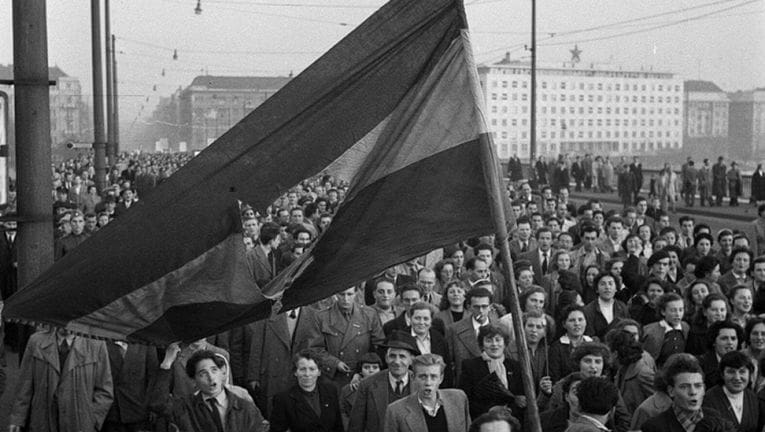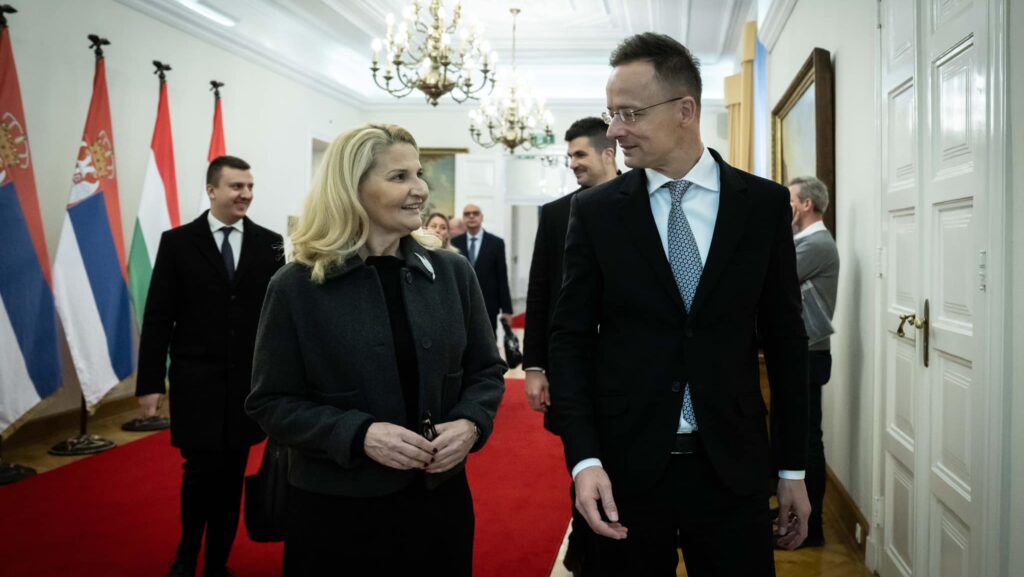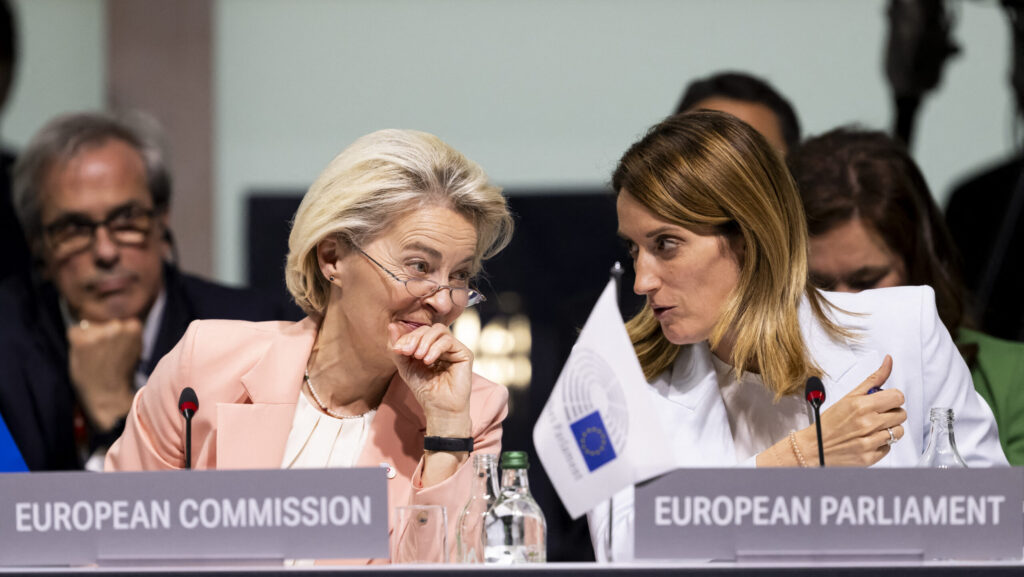I am neither Hungarian, nor a poet, nor a novelist, nor a writer of imaginative and creative works, but a journalist and cold-blooded political analyst. So my only justification for a most heartfelt recommendation of Down Fell the Statue of Goliath. Hungarian Poets and Writers on the Revolution of 1956 is that I believe this book to be an important one that deserves to be read not only in Hungary and the Hungarian diaspora—where it will be appreciated, indeed treasured—but also by those abroad who need to be reminded of what the Hungarian Revolution was and why it should be cherished by all decent people. We need, in other words, to remind the world of what it felt spontaneously at the time but has now forgotten.
As such, the book is in one important respect a quixotic enterprise. It is a collection of prose and poetic responses to a revolution and war of independence. The responses glow with many emotions—with compassion, with regret, with rage, with tenderness, but above all, with pride. That is an oddity. I do not think I need demonstrate how rare it is for a war to be celebrated or even just remembered with pride, at least in the world of literature.
It is sensible to wish not to be killed, and it is an elementary decency to wish not to kill other people
War poems today are almost always anti-war poems—and have been since the Great War of 1914–1918. That is understandable and usually creditable. It is sensible to wish not to be killed, and it is an elementary decency to wish not to kill other people. One can make only the most qualified arguments for engaging in war, namely, that it is sometimes preferable to much worse things such as slavery, genocide, and gross injustice. Even then, the decision to take up arms has to pass a series of moral and practical tests which can be summed up in the question: is the outcome of a war likely to be an improvement on a significantly unjust status quo? The end result of such a test will usually and rightly be a strong predisposition never to start or to enter military conflict voluntarily and to condemn those who do.
Human beings have not always felt this way; and they will not always feel this way in the future. We are both surprised and disturbed when we read of how the young men of Germany and England, and their allies such as Hungary and Italy marched off gladly to war in moods of optimistic and passionate patriotism. It seems naive and superficial and an invitation to disillusionment.
In fact, disillusionment did not occur at the time. While the war continued, most people remained patriotic. But as the corpses mounted, their patriotism had to be expressed in a minor key. Hence, we find deeply sombre poetic expressions of the same bellicose sentiments that were sung and shouted joyfully in August 1914.
One of the most powerful patriotic poems in English to emerge from the First World War was written by a young Canadian officer in 1915 following his friend’s death in battle. ‘In Flanders Fields’ is still read on Remembrance Day, 11 November, in England. It still packs a punch. Some of its impact comes from the melancholy fact that the voices speaking in it are those of the dead soldiers buried where the poppies grow in Flanders.
We are the Dead. Short days ago
We lived, felt dawn, saw sunset glow,
Loved and were loved, and now we lie
In Flanders fields.
These voices counsel not peace nor forgiveness, however, but revenge and renewed determination to press on to victory:
Take up our quarrel with the foe:
To you from failing hands we throw The torch; be yours to hold it high.
If ye break faith with us who die
We shall not sleep, though poppies grow In Flanders fields.
A reason why these sentiments are now minority ones—and why the First World War poems that we tend to quote and anthologize express much more pacifistic sentiments, is because of what happened afterwards. What was supported as the war to end all wars ended, in the words of Earl Wavell, as the peace to end all peace. That cast a retrospective light of disillusionment over any more positive interpretations of the Great War. Ernest Hemingway expressed one of the most influential responses to the war when he developed a staccato English that consciously avoided any of the ten-dollar words such as, well, patriotism. That disillusionment flowered into a literary orthodoxy almost a decade after the end of the war, following novels and films like All Quiet on the Western Front and the growing popularity of the English war poets.
We cannot dismiss the case for disillusionment lightly. It is justified if the cause being fought over is an unjust one, or one founded on lies and deceptions, or one persisted in when any reasonable hope of a better outcome has evaporated. Some of these criticisms attached themselves to the Great War when the details of the peace treaties became known and were implemented, often cruelly. A decade after the war’s end, an almost totaldisillusionment towards any war claiming to be just established itself in the civilized mind.
It seemed to fade briefly when the Spanish Civil War aroused a generation of young left-wing idealists, inspiring them to leave their countries and journey to join the ‘anti-fascist’ forces defending the Republic. Poets, novelists, journalists in England contributed to a 1937 book titled Authors Take Sides in the Spanish War, almost all against Franco and eager for intervention by London and Paris to save the Republic. Among them was W. H. Auden, who published a poem on the war, titled simply ‘Spain’ that included the lines:
To-morrow for the young the poets exploding like bombs,
The walks by the lake, the weeks of perfect communion;
To-morrow the bicycle races
Through the suburbs on summer evenings. But to-day the struggle.
To-day the deliberate increase
in the chances of death,
The conscious acceptance of guilt in the necessary murder;
To-day the expending of powers
On the flat ephemeral pamphlet and the boring meeting.
It was a little hard to maintain this attitude when it became clear, after Orwell’s Homage to Catalonia, that the war had not been a pure battle for the just city against the fascists but a smokescreen behind which Stalin’s agents (including Ernő Gerő, who later ordered mass murder in Budapest) had been decimating the idealistic ranks of the non-communist left. Auden altered the lines I quote above—to remove the phrase ‘necessary murder’—and he would not publish the poem in his Collected Works because he thought it rhetorically dishonest. Disillusionment thus revived again on the left until the Nazi–Soviet Pact in August 1939 and the opening of the Second World War.
For the next two years, the left was divided over whether to support the war— social democrats seeing it as a war to defend democracy, Marxists treating the war as one between indistinguishable ‘capitalist states’ from which socialists should hold themselves aloof. Their pose of virtuous disillusionment was an insincere one, however, which reflected pro-Soviet sympathies and imitated the somersaults of Kremlin policy. It was promptly abandoned when Hitler betrayed Stalin and invaded Russia. Communists throughout the West became jingoists for Moscow overnight.
On the right, however, the Nazi–Soviet Pact had provoked a more substantial illusion and subsequent greater sense of self-deception and betrayal. Evelyn Waugh had been one of only five writers in the Spanish War symposium to oppose support for the Republic on the grounds that it was rooted in ignorance of Spanish realities. But in his great trilogy on the Second World War, Sword of Honour, he has his gentlemanly English Catholic hero, Guy Crouchback, respond to the news of the Pact with a commitment to a battle for chivalric ideals: ‘The enemy at last was plain in view, huge and hateful, all disguise cast off. It was the Modern Age in arms. Whatever the outcome there was a place for him in that battle.’
By the end of the novel, however, the Soviet Union is one of the victors; it has occupied half of Europe, including countries that Britain went to war to defend; the West has accepted this divided Europe at Yalta; and millions have died in the conflict. Guy himself feels the futility of a war for ideals. A Jewish woman whom he tries to protect from Tito’s communists (ineffectually as it turns out—she is compromised by his help) tells him:
‘It seems there was a will to war, a death wish, everywhere. Even good men thought their private honour would be satisfied by war. They could assert their manhood by killing and being killed. They would accept hardships in recompense for having been selfish and lazy. Danger justified privilege. I knew Italians—not very many perhaps—who felt this. Were there none in England?’
‘God forgive me’, said Guy. ‘I was one of them.’
That was not a judgement that most ordinary English people could feel in 1945 or for a long time afterwards. At that time, it would have been more readily understood in the half of Europe separated from Britain by Yalta more than by the Channel. Poles and other Central Europeans had crossed the latter, joined the British war effort in 1940, and fought with distinction in all theatres of war. But they were denied participation in the victory celebrations in London of 1945 because of Whitehall’s official policy of not offending the Soviet allies who had arrived much later. Realpolitik trumped chivalry even on occasions meant to express it. And it became still harder to celebrate the Second World War as one of chivalric virtue when the Soviet Union imposed its own form of left-imperialism and imprisoned those of its wartime allies who were unwise enough to return to it from Britain.
By 1956, disillusionment with chivalric or martial ideas or even just ordinary love of country was again de rigueur in the world of words
Post-war austerity—the fact that victory was coloured grey—did the rest. By 1956, disillusionment with chivalric or martial ideas or even just ordinary love of country was again de rigueur in the world of words. There was almost a literary taboo against poetry or imaginative prose that treated heroism, self-sacrifice, or love of country in anything other than a disapproving pacifist way. Patriotism was just about acceptable as a sort of green environmentalism, but it was frowned on as a political or moral statement of any other kind. In Central Europe, it must have been further discredited, I imagine, by the cranking out of Soviet-style proletarian nationalism in the controlled media. Not least because it was reinforced everywhere by the fear, both real and cultivated, of nuclear weaponry that had the potential to destroy all life, all humankind.
This mood was expressed most straightforwardly by one of the most important cultural events in post-war British theatre: the first staging of John Osborne’s play, Look Back in Anger, in which its central character and anti-hero, Jimmy Porter, uttered these immediately famous words: ‘I suppose people of our generation aren’t able to die for good causes any longer. We had all that done for us, in the thirties and the forties, when we were still kids. … There aren’t any good, brave causes left.’
Look Back in Anger had its first night in May 1956, and it was immediately celebrated as both a boldly controversial play and yet at the same time the expression of the ideas and emotions of a new generation of young British writers, in particular the ‘Angry Young Men’. That expression was, of course, the controversial. But it was also the latest expression of a disillusionment that had been threading through Western culture since 1918.
Five months after the premier of Look Back in Anger, the Hungarian Revolution broke through this rooted sentiment of the artistic world and intellectual public, and won their unstinting admiration and support. Today this selection of poems, diary entries, letters, short stories, and other works of the mind and imagination stimulated by 1956 reads as that very unlikely paradox: the celebration of a tragedy. Against all the odds, it elevates courage and puts disillusionment to flight.
I do not think I can explain why it has these effects. One cannot really explain a poem or how it stirs us, since the same poem can elicit very different reactions from different people.
All one can say is: read the thing and feel it for yourself. But I can throw out a few simple and obvious ideas on why our reactions to 1956 are so powerfully similar to the reactions of other people, while diverging sharply from our reactions to the earlier works and events discussed above.
To begin with, though there are modernist works in this volume, there is no hint of the ambiguities, uncertainties, detachment, and anti-climaxes that we often find in modernism. Nor were there such in the actual events of 1956. The Revolution was two weeks snatched from the Heroic Age and plonked down in the twentieth century. Time magazine put a painting of a generic Hungarian revolutionary on the cover of its ‘Man of the Year’ issue (there is a revolutionary Hungarian Woman of the Year visible over his shoulder) and for once, it expressed a universal opinion.
We had all been acclaiming the modernist anti-hero in the novels, plays, and films of the fifties and later. But we did so with some doubts about his doubts, and it was a relief to run into a hero who recognized evil, fought it bravely, and for a moment seemed to prevail, without constantly second-guessing his own motives or looking on dispassionately as his fate was decided.
Nor were we tempted to sympathize with his oppressor, who happened also to be the oppressor of all. The volume’s title—Down Fell the Statue of Goliath—is alone enough to explain the West’s admiration for 1956 and the proud celebration it receives in this volume. By 1956, everyone knew Goliath. He was not the imaginary bringer of social justice whom some mistakenly welcomed in 1945. There could be no sympathy for a totalitarian regime that ran its tanks over both people’s bodies and their hopes. Thus, there could be no disillusionment with resistance to Goliath, whether it succeeded or failed. So when his statue was pulled down, ‘even the ranks of Tuscany could scarce forbear to cheer’. Reporters for communist papers in the West resigned and wrote the truth of what they saw.
Goliath was not himself vanquished, but he had been deeply wounded—wounded in a faculty that he himself prized but that different and earlier ogres had not bothered cultivating. Auden recognized the lasting disability from that wound when Goliath crushed another uprising in 1968.
The Ogre does what ogres can, Deeds quite impossible for Man, But one prize is beyond his reach: The Ogre cannot master speech.
About a subjugated plain,
Among its desperate and slain,
The Ogre stalks with hands on hips, While drivel gushes from his lips.
Even if Goliath had mastered speech, it would have done him no good, because the nature of the Hungarian Revolution had deprived him of his usual arguments. It was not a battle for someone else’s territory or for any objective with even a hint of moral taint. It was a revolution by ordinary people—by workers as well as by students—to recover the simple personal liberty that people throughout Western Europe already took for granted. But it was also a popular national revolution to recover the independence of the country from an occupying power. It was a Hungarian revolution in which Hungarians of almost every political faction took part, with none of them manoeuvring carefully to calculate how he might emerge on top of the heap in a future Hungarian democracy.
And, alas, there was no Hungarian democracy in their future, not for another thirty confusing years spent by the survivors crossing a desert of national betrayal and political seduction until eventually the promise of 1956 was redeemed. Just as Hungary had wounded Goliath deeply in 1956, so a later Hungary outwitted Goliath in 1989 and brought down not the statue but the monster itself by holding a picnic to conceal the flight of his captives.
Thousands of Hungarians, young and old, never lived to see that day of liberation. Some died in battle, some in the prisons and labour camps of Goliath, some in exile. But in those two short weeks, they had achieved astounding things. As well as woundingGoliath, as it turned out, fatally, they had wiped away the memory of 1944 and 1945 with all their crimes and sad ambiguities. They had changed how the world saw Goliath, yes, but more importantly they had changed how the world saw Hungary and Hungarians, not as bitter-sweet ironists, witty pessimists with a death-wish, sophisticated bystanders of history, but as young gallants—of both sexes— gambling against great odds and turning their losses into heroic reputation. That heroism had always been there, but now the world could see it unclouded.
Even in the world of words, they put disillusionment itself to flight too. As this volume demonstrates on page after page, they forced the world to concede that bravery, self-sacrifice, and love of country and one’s fellow-countrymen are qualities we need for those moments and great causes that come along rarely, sometimes very inconveniently, but always compellingly. There are always good, brave causes in the world, and sometimes there are good, brave people to fight for them.
Goliath learned that. So did Jimmy Porter. The rest of us should not forget it.
Speech delivered on 17 May 2017, at the book launch of Down Fell the Statue of Goliath. Hungarian Poets and Writers on the Revolution of 1956 (Budapest: Magyar Művészeti Akadémia, 2017), 335 pp.








